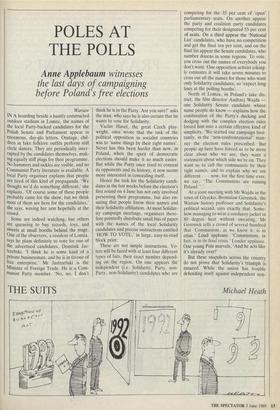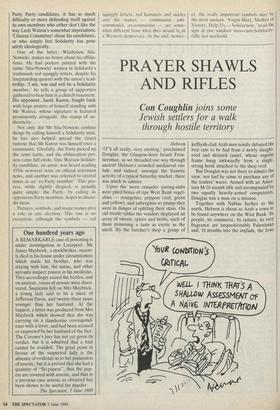POLES AT THE POLLS
Anne Applebaum witnesses
the last days of campaigning before Poland's free elections
Warsaw IN A hoarding beside a hastily constructed outdoor stadium in Lomza, the names of the local Party-backed candidates for the Polish Senate and Parliament appear in enormous, day-glo letters. Onstage, chil- dren in fake folklore outfits perform stiff circle dances. They are periodically inter- rupted by the candidates themselves, mak- ing equally stiff plugs for their programme. No hammers and sickles are visible, and no Communist Party literature is available. A local Party organiser explains that people are tired of this kind of propaganda. 'We thought we'd do something different,' she explains. 'Of course some of these people probably came for the show, but we think most of them are here for the candidates,' she says, waving her arm hopefully at the crowd.
Some are indeed watching, but others are queueing to buy records, toys, and sweets at small booths behind the stage. One of the observers, a resident of Lomza, says he plans definitely to vote for one of the advertised candidates, pominik Jas- trzebski. 'I think he is some kind of a Private businessman, and he is in favour of free enterprise.' Mr Jastrzebski is the Minister of Foreign Trade. He is a Com- munist Party member. 'No, no, I don't
think he is in the Party. Are you sure?' asks the man, who says he is also certain that he wants to vote for Solidarity.
Vaclav Havel, the great Czech play- wright, once wrote that the task of the political opposition in socialist countries was to 'name things by their right names'. Never has this been harder than now, in Poland, when the spirit of democratic elections should make it so much easier. But while the Party once tried to conceal its opponents and its history, it now seems more interested in concealing itself.
Hence the task for the Solidarity candi- dates in the last weeks before the election's first round on 4 June has not only involved presenting their programme, but also en- suring that people know their names and their Solidarity affiliation. At most Solidar- ity campaign meetings, organisers there- fore pointedly distribute small bits of paper with the names of the local Solidarity candidates and precise instructions entitled 'HOW TO VOTE,' in large, easy-to-read block print.
These are not simple instructions. Vo- ters will be faced with at least four different types of lists, their exact number depend- ing on the region. On one appears the independent (i.e. Solidarity, Party, non- Party, non-Solidarity) candidates who are competing for the 35 per cent of 'open' parliamentary seats. On another appear the party and coalition party candidates competing for their designated 55 per cent of seats. On a third appear the 'National List' candidates, who have no competition and get the final ten per cent, and on the final list appear the Senate candidates, who number dozens in some regions. To vote, you cross out the names of everybody you don't want. One opposition activist joking- ly estimates it will take seven minutes to cross out all the names for those who want only Solidarity candidates, so 'expect long lines at the polling booths'.
North of Lomza, in Poland's lake dis- trict, the film director Andrzej Wajda — one Solidarity Senate candidate whose name people do know — explains how the combination of the Party's ducking and dodging with the complex election rules forced him into a certain effective kind of simplicity. 'We started our campaign hesi- tantly, in the "non-confrontational" man- ner the election rules prescribed. But people up here have forced us to be more clear about who we are, they want a statement about which side we're on. They want us to call the communists by their right names, and to explain why we are different . . . now, for the first time ever, we say, "The Communists are ruining Poland." ' At a joint meeting with Mr Wajda in the town of Glyzcko, Bronislaw Geremek, the Warsaw history professor and Solidarity's political wizard, says exactly that. Some- how managing to wear a corduroy jacket in 80 degree heat without sweating, Mr Geremek tells a crowd of several hundred that 'Communism, as we know it, is in crisis.' Loud applause. 'Communism, in fact, is in its final crisis.' Louder applause. One young Pole marvels, 'And he acts like it's already over!'
But these snapshots across the country do not prove that Solidarity's triumph is ensured. While the union has trouble defending itself against independent non- Party Party candidates, it has as much• difficulty or more defending itself against its own members who either don't like the way Lech Walesa's somewhat imperialistic. 'Citizens Committee' chose his candidates,. or who simply feel Solidarity has gone adrift ideologically.
One of the latter, Wladyslaw Sila- Nowicki, makes no bones about his affilia- tions. He had posters printed with the name 'Sila-Nowicki' written in Solidarity's trademark red squiggly letters, despite his longstanding quarrel with the union's lead- ership. 'I am, was and will be a Solidarity member,' he tells a group of supporters gathered to hear him in a church basement. His opponent, Jacek Kuron, fought back with large posters of himself standing with Mr Walesa, whose signature is featured prominently alongside, the stamp of au- thenticity.
Not only did Mr Sila-Nowicki confuse things by calling himself a Solidarity man, he has also helped spread the (true) rumour that Mr Kuron was himself once a communist. Gleefully, the Party picked up the same tactic, and the obfuscation pro- cess came full circle. One Warsaw Solidar- ity candidate, an actor, was heard reading 1950s newsreel texts on official television news, and another was referred to several times as an 'ex-Party member'. This pro- cess, while slightly illogical, is actually quite simple: the Party. by calling its opponents Party members. hopes to discre- dit them.
Pictures, symbols, and magic names play a role in any election. This one is no exception. although the symbols — red squiggly letters, red hammers and sickles
and the names communist, anti- communist. ex-communist — are some- what different from what they would he in a Western democracy. In the end. howev- er. the really important symbols may be the most ancient. 'Virgin Mary, Mother of Victory, I lelp Us — Solidarnosc.' read the sign at one outdoor 'mass-cum-Solidarity- rally last weekend.



















































 Previous page
Previous page